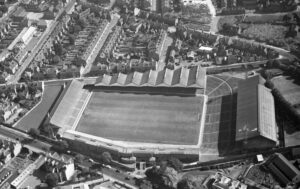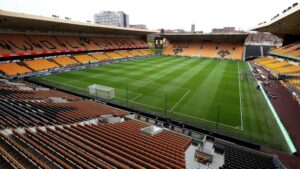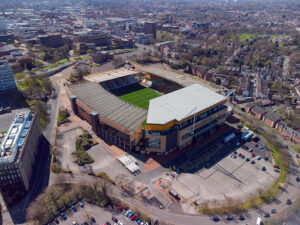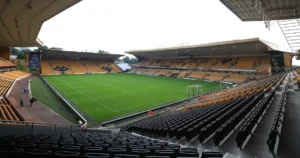Molineux Stadium: History, Capacity, and Location
Molineux Stadium is a football stadium situated in Wolverhampton, West Midlands, England. It has been the home ground of Premier League club Wolverhampton Wanderers since 1889. The stadium was one of the first British grounds to have floodlights installed and was the first stadium built for use by a Football League club.
The stadium has undergone several renovations and expansions over the years, with the most recent one being completed in 2012. It has a seating capacity of 32,050, making it one of the largest stadiums in the Premier League. The stadium boasts several facilities, including a museum, a megastore, and several bars and restaurants.
Key Takeaways
- Molineux Stadium is a football stadium situated in Wolverhampton, West Midlands, England, and has been the home ground of Premier League club Wolverhampton Wanderers since 1889.
- The stadium was one of the first British grounds to have floodlights installed and was the first stadium built for use by a Football League club. It has a seating capacity of 32,050 and several facilities, including a museum, a megastore, and several bars and restaurants.
- Over the years, the stadium has undergone several renovations and expansions, with the most recent one being completed in 2012.
History

Molineux Stadium is a football stadium located in Wolverhampton, West Midlands, England. It has been the home ground of Premier League club Wolverhampton Wanderers since 1889. The stadium was built for use by a Football League club, and it was one of the first British grounds to have floodlights installed.
Construction and Opening
The stadium was constructed on land purchased by Benjamin Molineux, a local merchant to the city. The first match played at Molineux was on September 7, 1889, where Wolves beat Notts County 2-0. The stadium was initially a simple affair, consisting of just one stand and a few open terraces. Over time, additional stands were added, and the stadium began to take shape.
Renovations and Expansions
Over the years, Molineux Stadium has undergone several renovations and expansions. In 1923, Wolves were able to buy the ground the stadium stood on, and soon after started building a new main stand, the Waterloo Road Stand, which had been designed by Archibald Leitch. The stand was completed in 1925 and was one of the first stands in the country to be built using reinforced concrete.
In the 1950s, Molineux underwent a major renovation, which included the construction of the Billy Wright Stand. The stand was named after the former Wolves and England captain, who played over 500 games for the club. In 1979, the John Ireland Stand was built, and in 1993, the Molineux Street Stand was constructed. The stadium’s capacity was increased to 31,700 in 2012, with the addition of the Stan Cullis Stand.
Today, Molineux Stadium is a modern, state-of-the-art stadium, with a capacity of over 32,000. It is widely regarded as one of the best stadiums in the Premier League, and a fantastic venue for football matches.
Structure and Facilities

Stadium Layout
Molineux Stadium is a football stadium situated in Wolverhampton, West Midlands, England. It has undergone several renovations since its inception in 1889. The stadium has four stands: the Steve Bull Stand, the Billy Wright Stand, the Sir Jack Hayward Stand, and the Stan Cullis Stand. The Steve Bull Stand is the largest and is located behind the goalposts. The Billy Wright Stand is located on one side of the pitch, while the Sir Jack Hayward Stand is located opposite it. The Stan Cullis Stand is located at one end of the stadium and is the newest stand, having been opened in 2012.
Seating Capacity
Molineux Stadium has a seating capacity of 31,700 seats. The Steve Bull Stand is the largest stand in the stadium, with a capacity of 9,500 seats. The Billy Wright Stand has a capacity of 8,000 seats, while the Sir Jack Hayward Stand has a capacity of 7,700 seats. The Stan Cullis Stand, which is the newest stand, has a capacity of 6,500 seats.
Hospitality Areas
Molineux Stadium offers various hospitality areas for fans to enjoy. The WV1 Bar is located in the Billy Wright Stand and offers a relaxed atmosphere with a range of food and drinks. The International Restaurant is located in the Stan Cullis Stand and offers a fine dining experience with panoramic views of the pitch. The Hayward Suite is located in the Sir Jack Hayward Stand and offers a more informal atmosphere with a range of food and drinks. The Presidents Club is located in the Steve Bull Stand and offers a luxurious experience with a three-course meal and complimentary drinks.
Overall, Molineux Stadium offers a variety of seating options and hospitality areas to suit all fans’ needs.
Usage

Home of Wolverhampton Wanderers FC
Molineux Stadium has been the home ground of Wolverhampton Wanderers FC since 1889. The stadium has a total capacity of 32,050 seats, with the most recent expansion being completed in 2012. The stadium has four stands, the Billy Wright Stand, the Steve Bull Stand, the Sir Jack Hayward Stand, and the Stan Cullis Stand. The Steve Bull Stand is the largest stand in the stadium, with a capacity of 9,500 seats.
International Matches
Molineux Stadium has hosted several international matches, including England’s first-ever match against a non-UK team, which was against Ireland in 1946. The stadium also hosted several matches during the 1966 FIFA World Cup, including a quarter-final match between Portugal and North Korea. In addition, the stadium hosted several matches during the 1996 UEFA European Football Championship, including a quarter-final match between France and the Netherlands.
Other Events
Apart from football matches, Molineux Stadium has also hosted other events such as concerts and boxing matches. Notable concerts held at the stadium include performances by Bon Jovi, U2, and Oasis. The stadium has also hosted several boxing matches, including a heavyweight bout between Lennox Lewis and Oliver McCall in 1997.
Overall, Molineux Stadium is a versatile venue that has hosted a variety of events over the years. With its rich history and modern facilities, it remains a popular destination for sports and entertainment.
Location and Accessibility

Molineux Stadium is located in the heart of Wolverhampton, West Midlands, England. The stadium’s address is Molineux Stadium, Waterloo Rd, Wolverhampton, WV1 4QR. The stadium is easily accessible by public transport and car.
Transport Links
Public transport is the best way to get to and from Molineux Stadium. The stadium is located in the center of Wolverhampton, a short 15-minute train ride from central Birmingham and Birmingham International Airport. Wolverhampton’s train station is located just a few minutes’ walk from the stadium, making it easy to get to the stadium from anywhere in the UK. There are also several bus routes that stop near the stadium, making it easy to get to the stadium by bus.
Parking Facilities
There are several parking facilities available around the stadium, including on-street parking and several car parks. However, on match days, parking can be limited, and traffic can be heavy. The stadium encourages fans to consider alternative travel options to reduce local traffic jams and inconsiderate parking around the stadium.
The stadium also provides parking facilities for disabled fans. Fans with disabilities can park in the stadium’s accessible car park, which is located close to the stadium’s entrance. The stadium also provides a shuttle service for fans with disabilities, which runs from the car park to the stadium’s entrance.
Overall, Molineux Stadium is easily accessible by public transport and car, making it easy for fans to get to the stadium on match days.
Significant Matches

Notable Club Matches
Molineux Stadium has witnessed numerous significant matches in Wolverhampton Wanderers’ history. One of the most memorable matches took place on 25 February 1959 when Wolves played against Honved, a Hungarian team that was considered one of the best in the world at the time. The match ended in a 2-2 draw, but it was a significant moment for English football as it was the first time a British team had played against a continental European team in a competitive match.
Another notable match was the 1972 UEFA Cup final between Wolverhampton Wanderers and Tottenham Hotspur. The first leg of the final was held at Molineux Stadium, and Wolves won the match 2-1. However, they lost the second leg 1-0 at White Hart Lane, and Tottenham Hotspur won the cup on away goals.
Historic Tournaments
Molineux Stadium has also hosted several historic tournaments over the years. One of the most significant tournaments was the 1966 World Cup, which was held in England. Molineux Stadium hosted one of the quarter-final matches between Portugal and North Korea. The match was a thrilling encounter, with Portugal coming from 3-0 down to win the match 5-3.
In 2000, Molineux Stadium hosted several matches during the UEFA European Women’s Championship. The stadium was used for three group stage matches and a semi-final. The tournament was won by Germany, who defeated Sweden 1-0 in the final.
Overall, Molineux Stadium has been the site of many significant matches and tournaments throughout its history. Its rich history and iconic status have made it a popular destination for football fans from all over the world.
Community and Cultural Impact

Local Economy
Molineux Stadium has had a significant impact on the local economy of Wolverhampton. As one of the largest and most well-known stadiums in the region, it has attracted visitors from all over the country and beyond. This has led to the growth of local businesses, such as hotels, restaurants, and shops, which benefit from the influx of tourists and football fans during match days.
In addition to this, the stadium has also created numerous job opportunities for the local community. From matchday staff to security personnel, there are a variety of roles that are required to keep the stadium running smoothly. This has helped to reduce unemployment rates in the area and provide a stable source of income for many families.
Community Programs
Molineux Stadium has also played an important role in promoting social initiatives and community programs in Wolverhampton. The stadium has worked closely with local charities and organizations to support various causes, such as improving access to sports for children and promoting healthy lifestyles.
One example of this is the Wolves Community Trust, which is the official charity of Wolverhampton Wanderers Football Club. The trust works to engage with the local community through a variety of programs, including football coaching sessions, disability sports programs, and educational workshops.
Overall, Molineux Stadium has had a positive and lasting impact on the Wolverhampton community. By supporting local businesses, creating job opportunities, and promoting social initiatives, the stadium has become an integral part of the area’s identity and development.
Future Developments
Molineux Stadium has undergone several renovations and expansions over the years, and there are plans for further developments in the future. The current capacity of the stadium is around 31,700, but the owners of Wolverhampton Wanderers, Fosun International, have expressed their desire to expand the stadium to increase the capacity to 46,000.
The £46m plan for the redevelopment was revealed in 2019, which included replacing the Steve Bull Stand and adding extensive corporate facilities. However, due to the COVID-19 pandemic, the expansion plans have been put on hold for the time being, according to a source. Talks are still ongoing between the club and the council regarding the expansion plans, and the council has outlined a potential “Molineux Quarter” development, which could include the redevelopment of new academic buildings, mixed-use development, and public realm, centered around expanding the football stadium and the university with potential for new commercial/leisure facilities.
The need for expansion is not only due to the growing popularity of Wolverhampton Wanderers but also due to the demand for season tickets. Thousands of fans are currently on the season ticket waiting list, and the expansion plans would help to meet the demand. With the proposed expansion, the Molineux Stadium would become one of the largest stadiums in the Premier League, attracting more fans and generating more revenue for the club.
In conclusion, the future developments of Molineux Stadium look promising, with plans for expansion and redevelopment in the works. While the COVID-19 pandemic has put the expansion plans on hold for the time being, the council and the club are still committed to the vision of a larger, more modern stadium that can accommodate the growing fan base of Wolverhampton Wanderers.
Frequently Asked Questions

What is the seating capacity of Molineux Stadium after the latest renovations?
The seating capacity of Molineux Stadium is 31,700 after the latest renovations. This is a significant increase from the previous capacity of 31,098. [1]
Can you provide details on the Molineux Stadium expansion plans?
There are currently no plans for further expansion of Molineux Stadium. However, the club has announced plans to upgrade the existing facilities, including the installation of new floodlights and improvements to the media and hospitality areas. [1]
Where can I find historical photos of Molineux Stadium?
The official website of Wolverhampton Wanderers Football Club has a dedicated section for historical photos of Molineux Stadium. Alternatively, the Wolverhampton City Archives and Local Studies service holds a collection of photographs and other materials related to the stadium’s history. [2] [3]
What is the capacity of the away end at Molineux Stadium?
The capacity of the away end at Molineux Stadium is approximately 3,000. However, this can vary depending on the specific match and the away team’s allocation. [1]
How can I locate the Molineux Stadium in Wolverhampton?
Molineux Stadium is located in the city of Wolverhampton, West Midlands, England. The stadium’s address is Waterloo Rd, Wolverhampton WV1 4QR, United Kingdom. Visitors can use public transportation, such as buses or trains, to reach the stadium. Alternatively, there are several car parks available in the vicinity of the stadium. [4]
What are the historical significances of Benjamin Molineux in relation to the stadium?
Benjamin Molineux was a prominent local landowner and benefactor who donated the land on which Molineux Stadium was built. The stadium was named in his honor, and his family continued to be involved in the club for many years. [1]
Other Stadiums Articles:
Check Out: Selhurst Park Stadium: Home of Crystal Palace FC
Check Out: King Abdullah Sports City Jeddah: A World-Class Sporting Destination
Check Out: Al-Awwal Park Stadium in Riyadh: A Comprehensive Guide
Check Out: Kingdom Arena Stadium Riyadh: The Ultimate Venue for Sports and Entertainment
Check Out: Royal Bafokeng Stadium: A World-Class Venue in South Africa
Tags: capacity of the away end at Molineux Stadium, historical significances of Benjamin Molineux in relation to the stadium, Molineux Stadium, Molineux Stadium Capacity, Molineux Stadium expansion plans, Molineux Stadium History, seating capacity of Molineux Stadium after the latest renovations